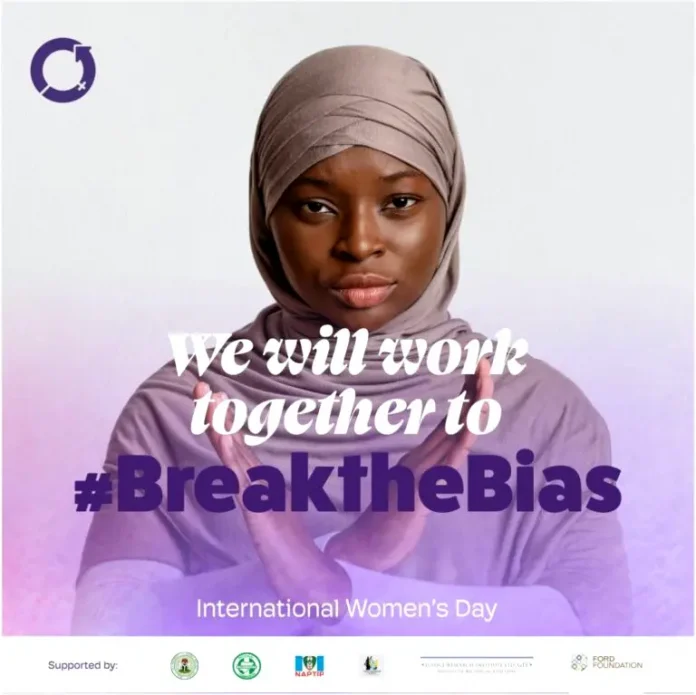The Justice Research Institute (JRI) has said women worldwide still struggle to find their pride of place in society and suffer many forms of violence against persons and human trafficking.
The Institute said this in a statement in commemoration of the 2022 International Women’s Day (IWD) celebrated worldwide on March 8.
This year’s Women History Month theme is Providing Healing, Promoting Hope, while the International Women’s Day is themed: “Breaking The Bias”.
“The United Nations (UN) first recognised the Month of March as Women History Month, which is an extension of International Women’s Day globally marked since March 8, 1975. It is an annual celebration aimed at raising awareness about gender equality, accelerating gender parity, amplifying women’s voices, highlighting challenges and violations suffered by women and girls across the globe, and celebrating women all geared towards achieving a fair and equitable world.
The 2022 Women History Month theme is Providing Healing, Promoting Hope, while the International Women’s Day is themed: “Breaking The Bias”. This theme invites the whole of government and society to pause and reflect on where we are now in breaking the barriers hindering women’s equality, helping survivors through the process of recovery and building hope. It invites us to make deliberate efforts against all forms of Sexual and Gender-Based Violence (SGBV), harmful cultural practices and stereotypes against women and girls and pushing for equity in the family, socio, economic and political lives of all women in Nigeria and across the world including Persons with Disabilities (PWD)”.
Raising the alarm over some unwholesome practices against women worldwide and its attendant consequences, the Institute said: “Violence against women is as serious a cause of death and incapacity among women of reproductive age as cancer, and a greater cause of ill-health than traffic accidents and malaria combined.”
Some of the problematic indices raised by JRI include;
“1 in 3 women and girls experience physical or sexual violence in their lifetime, most frequently by an intimate partner
Only 52% of women married or in a union freely make their own decisions about sexual relations, contraceptive use and health care
Worldwide, almost 750 million women and girls alive today were married before their 18th birthday, while 200 million women and girls have undergone female genital mutilation (FGM).
1 in 2 women killed worldwide were killed by their partners or family in 2017, while only 1 out of 20 men were killed under similar circumstances.
71% of all human trafficking victims worldwide are women and girls, and 3 out of 4 are sexually exploited.
The Institute noted that the inequalities against women were also evident during the COVID-19 pandemics. It is even more worrisome to imagine the inequity that the COVID -19 pandemic has further created for women and girls, from pay disparities to domestic threats/violence, trafficking in persons for possible sexual exploitation and forced labour, among others.
Many women still struggle to find their pride of place in the society and suffer many forms of violence against persons and human trafficking”.
To stem the tide against the age-long disparity suffered by the women, the JRI, in collaboration with the National Agency for the Prohibition of Trafficking in Persons (NAPTIP), the Nigerian Police Force (NPF), FCT SGBV-RT, National Human Rights Commission and Civil Society Groups, with funding from Ford Foundation have launched advocacy campaigns to further sensitise the general public on what the plights of women and what can be done to ameliorate it.
“Justice Research Institute in collaboration with the National Agency for the Prohibition of Trafficking in Persons (NAPTIP), the Nigerian Police Force (NPF), FCT SGBV-RT, National Human Rights Commission and Civil Society Groups, with funding from Ford Foundation is implementing a Broadcast Media Campaign. The campaign will engage and inform the public about the FCT SGBV-RT, Police GBV Unit, the NAPTIP Short Code, and the referral pathway, the Sexual Assaults Referral Centres (SARCs), and the Naming and Shaming of offenders through the National Sexual Offenders Database (NSOD). The project team will get the messaging across by deploying creative content on social media platforms and off-line broadcast radio media targeted at the general public.
The general public is invited to join forces with the first responder agencies in the fight against SGBV, trafficking in persons and related crimes that undermine the human rights and dignity of persons, especially women and girls. We invite you all to look out for our content on social media.


